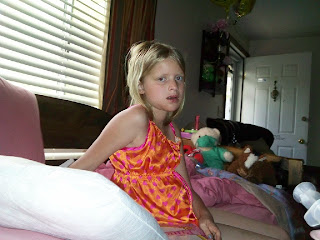What an amazing article I came across today on Austin's school, and to make it even better ~ Austin is in the picture!
New help for Autism By Elizabeth Stuart
Deseret News
Published: Monday, Dec. 28, 2009 9:32 p.m. MST
Pretty soon, Dani Hartog won't have to worry. She won't have to leave her car idling in the parking lot at Northridge High to drag her 15-year-old son, kicking and screaming, to his classroom. She won't get a tight feeling in her chest whenever the phone rings, wondering if the principal is calling to say the boy, who has autism, is missing again. She won't panic as she rushes from work to her home in South Weber, worried the teenager won't be safe in his usual hideout under the back porch. Because, pretty soon, Utah will have a public high school specifically designed to address the educational and social needs of children with autism and Asperger syndrome. "I was so elated when I heard the news, I literally jumped up and down," Hartog said. "The difference between specialized and mainstream education is night and day for my kid." Spectrum Academy, a three-year-old charter school that serves autistic children grades kindergarten through 8th, recently broke ground on a 32,300-square-foot, $5.5 million high school in North Salt Lake. Ninth and 10th grades will be available starting next fall; 11th and 12th grades will follow in 2011 and 2012.
Although one in every 133 Utah children has autism, according to a 2007 report by the Center for Disease Control and Prevention, Spectrum Academy is the only public school of its kind in the state. The high school will be the first in Utah — private or public — to cater to children with autism.
Such specialization runs counter to a federal and state push over the last decade to give children with learning disabilities equal access to a mainstream public education. All Utah public schools, in compliance with the federal Individuals with Disabilities Education Act, offer special education courses but place autistic children in traditional classrooms as frequently as possible.
"Under the current legislation, the presumption is you are going to put a child in a general environment and only add restrictions when it's absolutely necessary," said Richard Robison, executive director of The Federation for Children with Special Needs, a national nonprofit that promotes parental advocacy. "We want our children treated like every other child. We want them to be able to participate in the life of the school. We want them to be safe. We want them to have the appropriate aids and supports in place to help them learn and progress."
Nonetheless, most experts agree that children with autism, who vary in their levels of social, communicative and behavioral impairment, need individualized instruction, whether it be at a traditional school or a specialized school.
Tom Higbee, a professor of special education at Utah State University and one of the nation's foremost autism researchers, called such intervention "critical" to a child's success.
"They just have different learning styles," Higbee said. "It is difficult for children with autism to learn by observation, which is a teaching method a lot of public schools are built around. There's no prototype of a person with autism, so, to be effective, teaching needs to be pretty customized."
With small class sizes and a full staff of teachers certified in special education, a custom education is exactly what Spectrum Academy hopes to provide for autistic teens. There's a teacher's aid in every classroom and full-time occupational and speech therapists, too.
To afford all the extra amenities, the school augments its allotment of state education dollars with some $250,000 a year in private donations,
"The truth is, a lot of children just don't thrive in a traditional school environment," said Jaime Christensen, principal of Spectrum Academy. "For some kids, 'different' is just what they need in order to learn."
Spectrum is, by public school standards, a bit unconventional. Christensen calls the anomalies "tools to help the children excel."
The high school will offer vocational training as well as traditional and special education diplomas. Students on a college track can take concurrent enrollment classes.
Spectrum Academy's curriculum is tailored for the autistic mind and children are divided into grade levels, not by age, but by ability.
"We have high expectations for our kids, but we give them the help they need to rise to those expectations," Christensen said.
Toys are OK as long as students fiddle under their desks and keep their eyes on the teacher. Sitting up straight is optional; students kneel on chairs, slouch down, twist, twirl and kick. Some children trade traditional seats for big, bouncy exercise balls.
"I'm not worrying about that stuff, no way," Christensen said. "If they're doing their work, I'm happy. A lot of times being able to fiddle or wiggle is all these kids need to be able to concentrate."
The hallways are plastered with posters reminding children to "think about other's feelings" and adjust their behavior appropriately. Children, many of whom struggle to connect to peers, get a minimum of 30 minutes of social training a day.
The curriculum works for Kristofer Randall, 12, a seventh grader at Spectrum.
"I don't get stressed out as much at this school," he said. "If things seem loud to me and I get a headache, the teacher lets me take a short break so I can come back and pay attention better."
He's even involved in extracurricular activities. He's a class officer.
"I have lots of friends here and nobody makes fun of me," Randall said. "I'm excited to stay here for high school."
Hartog's son Kolby is pretty pumped about Spectrum, too.
"I hate this school," he tells his mother about Northridge, usually after an hourlong battle to get the boy dressed and on his way. "I hate that I can't do what the other kids do. I hate that everyone treats me different."
For her part, Hartog doesn't even care that she has to send Kolby through 10th grade twice in order to make the move.
"He just doesn't learn the same way everyone else does," she said. "I just want him to get an education and learn how to function in society."




















































